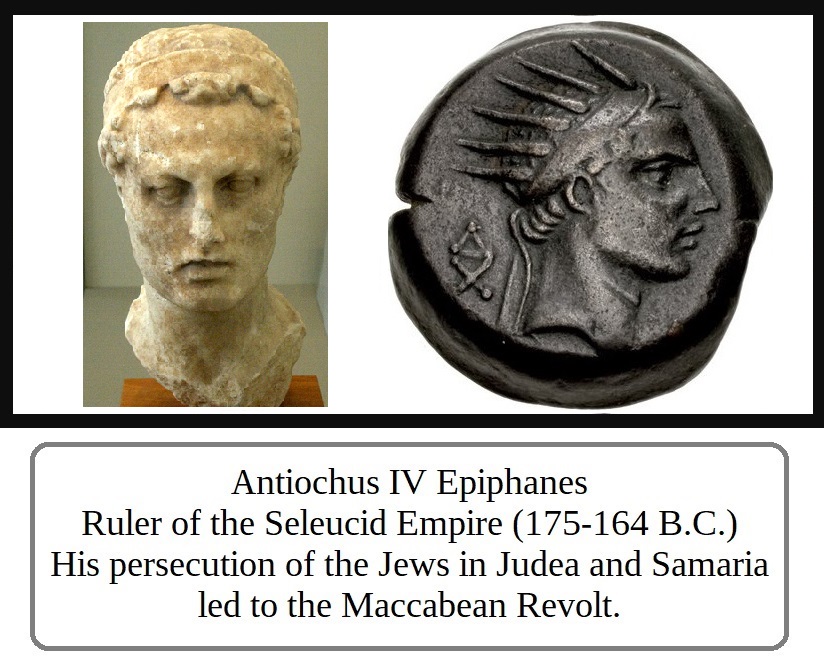“Go therefore and make disciples of all the nations…teaching them to observe all that I commanded you; and lo, I am with you always, even to the end of the age” (Matthew 28:19-20, NASB).
——————–
Contents:
1) “Since There Was a Nation” (Kyle Pope)
2) The A.D. 70 Doctrine (video sermon, Tom Edwards)
3) News & Notes
——————–

-1-
“Since There Was a Nation”
Kyle Pope
In Daniel chapter 11, God revealed to Daniel conditions that would exist in the period between the Old and New Testaments. It addresses the rise of “the realm of Greece” (Dan. 11:2). Prophetically, Daniel was told about the rise of Alexander the Great and the division of his kingdom among his generals following his death. In great detail, this prophecy shows how Israel would become caught in the power struggles between the Seleucids in Syria (to the north) and the Ptolemies in Egypt (to the south). It is so detailed that it has led some liberal scholars to argue it must have been written during the time of the events described and then added to the older sections of Daniel. We reject that conclusion and consider it to be inspired revelation and powerful evidence of Divine foreknowledge.
Part of this prophecy addresses the brutal persecution of the Jews that occurred when the Seleucid king, Antiochus IV, surnamed Epiphanes, controlled Palestine (175–164 BC). This persecution is addressed immediately before chapter 12, where Daniel is told: “And there shall be a time of trouble, such as never was since there was a nation” (Dan. 12:1b, NKJV). This is followed by one of the most explicit descriptions of the future resurrection in the Old Testament. It reads: “And many of those who sleep in the dust of the earth shall awake, some to everlasting life, some to shame and everlasting contempt” (Dan. 12:2). This echoes the future post-death deliverance promised to those faithful to the “holy covenant” (11:30) during the persecution in chapter 11: “those of understanding shall fall, to refine them, purify them, and make them white, until the time of the end” (Dan. 11:35). Daniel himself is promised that he will arise to his inheritance at “the end of the days” (12:13).
What is it about this persecution that would lead the Holy Spirit to describe it as “a time of trouble, such as never was since there was a nation”? Let’s consider what we know about this horrible time.
The Jewish Persecution of Antiochus IV Epiphanes
The persecution prophesied in Daniel 11 and fulfilled in the period between the Testaments was of a much different nature than anything Israelites had experienced prior to that time. The temple was not destroyed, nor were the walls of Jerusalem torn down, but it was an attempt to exterminate the Jewish religion in a way never seen “since there was a nation.” Early on, the influence of the Greeks had led to the building of a gymnasium in Jerusalem causing many Jewish men to forsake “the holy covenant” and live as Gentiles. Some literally made themselves “uncircumcised” in some way to participate naked in these athletic contests (1 Macc. 1:14-15). When Antiochus IV took the throne, he was given the surname, Epiphanes, meaning “illustrious” but his extreme behavior led some of his own people to change his surname to Epimanes “madman” (Livy, History of Rome 41.19). That was certainly an apt description of him in his treatment of the Jews. Following a failed effort to conquer Egypt, falsely believing there was a revolt among the Jews, he assaulted Jerusalem:
“Then there were massacres of young and old, destruction of women and children, slayings of virgins and infants. Within the total of three days eighty thousand were destroyed, forty thousand in hand-to-hand fighting, and as many were sold into slavery as were killed” (2 Macc. 5:13-14, NETS).
This toll of death and deportation is much higher than the biblical record reveals to us even during the fall of Jerusalem in 587 BC. But that was only the beginning! Antiochus himself went into the temple, took away the altar, the lampstand, the table of shewbread, the veil, and the “crown” with the gold and silver vessels, and 1,800 talents (1 Macc. 1:21-24; 2 Macc. 5:15-16, 21). His slaughter was not isolated to Jerusalem:
“Therefore there was a great mourning in Israel, in every place where they were; So that the princes and elders mourned, the virgins and young men were made feeble, and the beauty of women was changed. Every bridegroom took up lamentation, and she that sat in the marriage chamber was in heaviness, the land also was moved for the inhabitants thereof, and all the house of Jacob was covered with confusion” (1 Macc. 1:25-28, KJV).
Antiochus commanded one of his officers, Apollonius, with a force of 22,000 to kill those “in their best age” and to sell the young and women (2 Macc. 5:24). During later incursions, Jerusalem was further plundered and set on fire with houses and walls pulled down “on every side” (1 Macc. 1:31). The oldest portion of Jerusalem, known as the City of David, was seized and made a citadel for the forces of Antiochus.
In addition to this spoil and slaughter, the focus soon shifted to a direct attack on the faith of the Jews. Daily sacrifice at the temple was stopped for three and a half years (Josephus, Wars of the Jews 1.1). The temple was dedicated to Jupiter with unclean sacrifices and sexual immorality practiced within its courts (2 Macc. 6:2-5). Observance of the Sabbath and Jewish festivals were prohibited with those who disobeyed being put to death (2 Macc. 6:6, 9). Some who hid in caves to observe the Sabbath were found and burned to death all together (2 Macc. 6:11). Circumcision was forbidden and women who let their children be circumcised were publicly killed with their babies hanging around their necks (2 Macc. 6:10; 1 Macc. 1:60-61). All Hebrew Scriptures that could be found were burned and anyone found with any portion of the Scriptures was put to death (1 Macc. 1:56-58). Pagan shrines were erected all throughout Palestine and Jews were compelled to practice pagan worship. The historical books of 1 and 2 Maccabees record the details of this horrific time. Chapters 5-7 of 2 Maccabees read like a portion of Foxe’s Book of Martyrs describing those tortured and killed for refusal to eat pig’s flesh and obey these ungodly commands.
The reign of Antiochus IV Epiphanes was brief, and the Jews were eventually delivered from those trials by the rise of a Jewish resistance led by Judas Maccabeus. Yet this time was so traumatic in Jewish history it came to be commemorated annually by the Jews (including Jesus) as the “Feast of Dedication” (John 10:22) or Hanukkah. It involved a level of persecution of the Jewish faith unequalled “since there was a nation” (Dan. 12:1b). It is worth noting that Josephus in his Wars of the Jews, the primary source for what we know about the fall of Jerusalem in AD 70, does not begin with an account of the fall of Jerusalem in 587 BC but with an account of the persecution of Antiochus IV Epiphanes that had been prophesied by Daniel.
Conclusion
Paul told Timothy, “all who desire to live godly in Christ Jesus will suffer persecution” (2 Tim. 3:12). Thanks be to God that Christians living today in this country do not have to suffer the type of persecution these faithful souls faced centuries ago. While we pray that this time of peace and freedom of worship will continue, may God grant us the courage, faith, and strength of conviction that if conditions should ever change, we too could remain faithful to the “holy covenant” we enjoy in Christ. If so, we like them can have the same kind of assurance the Lord gave to the saints in Smyrna: “Be thou faithful unto death, and I will give you the crown of life” (Rev. 2:10b, KJV).
— Via Faithful Sayings, Volume 24, Issue 5 (January 30, 2022)
——————–
-2-
The A.D. 70 Doctrine
Tom Edwards
Just click on the following link for the video sermon with the above title:
https://thomastedwards.com/wordpress/AD_70_Doctrine.mp4
——————–
-3-
News & Notes
Donald Sears had his PET Scan Tuesday and saw another doctor Friday. He will meet with two of his doctors Monday to determine what procedures and treatments will be best for him. So far, only two of the tumors are malignant; and the cancer has not spread elsewhere.
Rick Cuthbertson had been feeling so bad since his last chemo treatment that after calling his doctor about it, he told him to come in for an unscheduled visit. Rick has also had trouble before with some of his cancer treatments.
Rex Hadley is now back home from rehab, after having a slight stroke. He is doing better, but still a little weak.
Ronnie Davis is still having to use oxygen continually. His next scheduled doctor’s appointment is not until July.
Doyle Rittenhouse is scheduled to have more nerve blocks April 14, but will first be seeing his doctor March 30.
Let us also be remembering in prayer the following: A.J. & Pat Joyner, Tammy Griffey, Jim & Martha Lively, Deborah Medlock, Lois Fletcher, Vivian Foster, Danielle Bartlett, and Kim Rowell.
——————–
The Steps That Lead to Eternal Salvation
1) Hear the gospel — for that is how faith comes (Rom. 10:17; John 20:30-31).
2) Believe in the deity of Jesus Christ, the Son of God (John 8:24; John 3:18).
3) Repent of sins. For every accountable person has sinned (Romans 3:23; Romans 3:10), which causes one to be spiritually dead (Ephesians 2:1) and separated from God (Isaiah 59:1-2; Romans 6:23). Therefore, repentance of sin is necessary (Luke 13:5; Acts 17:30). For whether the sin seems great or small, there will still be the same penalty for either (Matt. 12:36-37; 2 Cor. 5:10) — and even for a lie (Rev. 21:8).
4) Confess faith in Christ (Rom. 10:9-10; Acts 8:36-38).
5) Be baptized in water for the remission of sins (Mark 16:16; Acts 2:38; 22:16; 1 Pet. 3:21). This is the final step that puts one into Christ (Gal. 3:26-27). For from that baptism, one is then raised as a new creature (2 Cor. 5:17), having all sins forgiven and beginning a new life as a Christian (Rom. 6:3-4). For the one being baptized does so “through faith in the working of God” (Col. 2:12). In other words, believing that God will keep His word and forgive after one submits to these necessary steps. And now as a Christian, we then need to…
6) Continue in the faith by living for the Lord; for, if not, salvation can be lost (Matt. 24:13; Heb. 10:36-39; Rev. 2:10; 2 Pet. 2:20-22).
——————–
Tebeau Street
CHURCH OF CHRIST
1402 Tebeau Street, Waycross, GA 31501
Sunday: 9 a.m. Bible Class and 10 a.m. Worship Service. We also have a Song Service at 5 p.m. for every first Sunday of the month.
evangelist/editor: Tom Edwards (912) 281-9917
Tom@ThomasTEdwards.com
https://thomastedwards.com/go/all.htm (This is a link to the older version of the Gospel Observer website, but with bulletins going back to March 4, 1990.)

